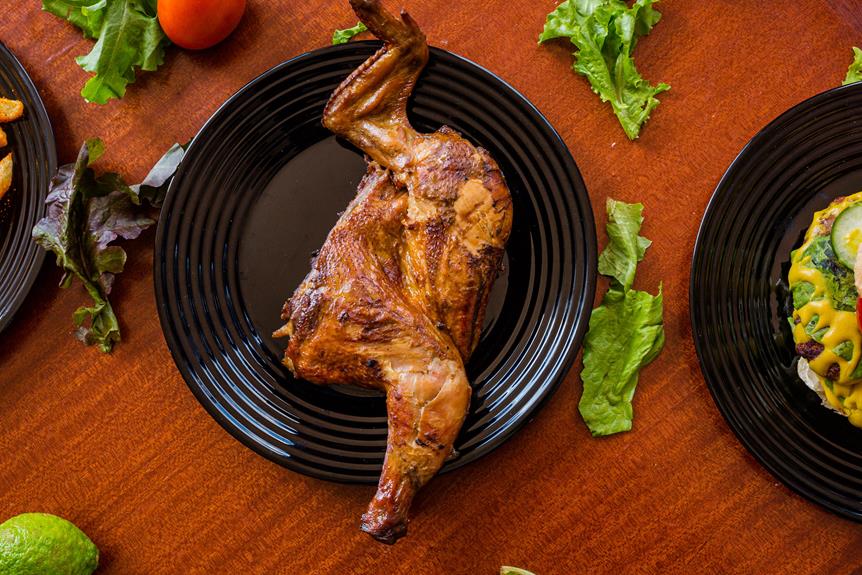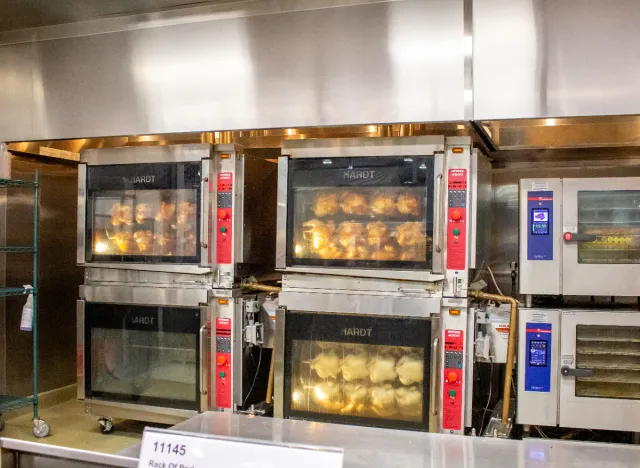Costco’s famous $4.99 rotisserie chicken is a staple for many shoppers This juicy, flavorful bird has garnered a cult-like following, with Costco selling over 100 million rotisserie chickens every year. But exactly how big are these chickens? Let’s take a closer look at how much a Costco rotisserie chicken weighs
The Typical Weight of a Costco Rotisserie Chicken
The typical cooked weight of a Costco rotisserie chicken is around 3 pounds. This is larger than the rotisserie chickens you’ll find at most grocery stores, which are often around 2 pounds.
Costco’s birds can range in weight, but usually fall somewhere between 3 to 3.5 pounds after cooking. You likely won’t find a Costco rotisserie chicken over 6 pounds, since birds larger than that won’t fit on the rotisserie spits in the deli.
So when you pick up a hot, roasted chicken at Costco, expect it to weigh about 3 pounds on average. That means each bite-size portion of breast, leg, thigh, or wing packs plenty of meat!
Why Costco Chickens Are Bigger
There are a few reasons why Costco rotisserie chickens are bigger than typical grocery store birds
-
Breeding – The chickens raised for Costco are bred to grow larger than conventional chickens. Through selective breeding, the broiler chickens grown for meat reach maturity quicker and achieve a heavier weight.
-
Young Age – Chickens raised for rotisserie cooking are slaughtered at a young age, around 47 days old. The earlier slaughter age allows the chickens to achieve a heavier weight in a shorter time.
-
Enhanced Diet – The diet of broiler chickens raised for Costco contains additional nutrients to promote rapid growth Their feed is fortified with higher protein and calories,
-
Hormone Injections – Contrary to some claims, chicken producers in the U.S. do not use artificial hormones. However, selective breeding intensifies natural growth hormones in broiler chickens.
So through a combination of breeding, diet, and age, the Costco chickens achieve a heavier 3 pound weight compared to typical rotisserie chickens.
How Rotisserie Cooking Impacts Weight
After the full-sized broiler chickens arrive at the Costco processing plant, they are seasoned, cooked, and prepared for the deli. During rotisserie cooking, some weight is lost as moisture evaporates.
According to poultry experts, a 6 pound raw chicken will decrease to around 3.5 to 4 pounds after rotisserie cooking. For the large broilers raised for Costco, the post-cooking weight lands around 3 pounds.
The rotisserie cooking locks in flavor and makes the meat juicy and tender. So while some weight is lost to evaporation, you’re left with a delicious, edible chicken.
How to Estimate Serving Sizes
Knowing the average weight of a Costco rotisserie chicken makes it easier to estimate portions. Here are some serving size guidelines:
- A whole 3 pound chicken contains about 12 servings of 3 ounces each
- The breast meat provides roughly 3 to 4 servings
- Each leg quarter contains 2 to 3 servings
- Count each thigh or drumstick as 1 serving
- Allow 1 to 2 servings per wing
Keep in mind that removing the skin and bones reduces the edible portion. But a 3 pound Costco chicken still provides ample meat for dinner along with leftovers for lunches or other meals.
Is the Price Per Pound a Good Value?
At $4.99 for a 3 pound bird, Costco’s rotisserie chicken breaks down to just $1.66 per pound.
That’s an excellent price when you consider the cost of buying an organic, free-range, or natural chicken at the grocery store. Whole chickens can cost $3 to $4 per pound or more.
When factoring in the seasonings, cooking, and convenience, Costco’s rotisserie chicken is quite a steal. It would be difficult and likely more expensive to roast your own 3 pound chicken at home.
How Costco Keeps Prices Low
Costco manages to keep their rotisserie chicken prices ultra-low by:
- Operating their own poultry plant to control processing costs
- Purchasing feed in bulk for chicken producers
- Cooking a high volume of chickens, which spreads out costs
- Using the chicken as a loss leader to draw customers in to spend on other higher-margin products
Costco seems committed to holding the $4.99 rotisserie chicken price despite inflationary pressures. This winning strategy has led to skyrocketing demand from bargain-hunting customers.
Health and Nutrition Considerations
While Costco’s rotisserie chicken is temptingly cheap, there are some health and nutrition factors to consider:
- The sodium content per serving ranges from 300 to 600 mg. Selecting breast meat reduces sodium intake.
- Cooking methods may use unhealthy oils. Opt for white meat and remove skin to reduce fat.
- Chicken raised conventionally contains more omega-6s than pasture-raised. Supplement with omega-3 rich foods.
- Quick-growing chicken contains less micronutrients like B vitamins than slow-growing breeds.
- Handling and storage until consumption impacts food safety. Refrigerate promptly.
Overall, Costco’s rotisserie chicken is a lean, protein-rich choice. But consumers seeking better nutrition may want to balance it with salad, whole grains, and produce.
Alternatives to Consider
While Costco’s famous $4.99 bird is appealing, you may want to explore some alternatives:
-
Organic or free-range chicken – More expensive, but has certifications for humane treatment and/or organic feed.
-
Local fresh chicken – Support smaller farms and reduce environmental impact of transport.
-
Whole raw chicken – Provides option to control ingredients, cooking method and seasoning.
-
Plant-based chicken – Try soy- or pea protein-based chicken for a vegetarian option.
-
Rotisserie chicken salad – Choose a pre-made salad with chicken for quicker meal prep.
The Takeaway on Costco Chicken Weight
Costco’s rotisserie chickens weigh about 3 pounds on average. This is heavier than typical grocery store cooked chickens. Through optimized breeding, feed, and processing, Costco provides plump broiler chickens at budget prices. A 3-pound chicken serves up to 12 portions, so take advantage of this bargain bird for easy dinners, lunches, and recipes! Just be mindful of nutrition and look for alternative choices like organic or vegetarian products if you have the budget.

The chicken is allegedly sold at a loss

Costco’s rotisserie chicken is reportedly a “loss leader”—a product sold below its actual market value to attract customers to the store, where they’ll hopefully purchase other profitable items.
In 2015, Galanti said, “When others were raising their chicken prices from $4.99 to $5.99, we were willing to eat, if you will, $30 to $40 million a year in gross margin by keeping it at $4.99.” However, in 2019, Jeff Lyons, Costco’s senior vice president of fresh foods, declined to tell CNN whether the retailer still loses money on its rotisserie chickens.
You can’t roast it yourself for any cheaper

Theoretically, the cheapest way to buy chicken is by picking up the whole uncooked bird because you won’t be paying for someone to cut it into parts or cook it for you. However, that’s not true at Costco, where the rotisserie chickens are actually cheaper than whole, uncooked birds.
A whole raw organic chicken at the warehouse can weigh as much as five pounds. Recently priced at $2.99 per pound, that works out to almost three times as much as the pre-cooked bird!
CONSUMER REPORTS: Is rotisserie chicken healthy?
FAQ
How much do rotisserie chickens weigh at Costco?
The average Costco rotisserie chicken weighs three pounds fully cooked. The birds raised for Costco are broiler chickens who have been genetically modified through breeding to grow very large, very quickly. About 100 years ago in 1925, chickens lived for 112 days before being slaughtered at 2.5 pounds.
How much chicken does a Costco rotisserie chicken yield?
Next to the cheap food court hot dogs and pizza slices, you can also purchase hot and flavorful rotisserie chickens from Costco’s meat department for only $4.99 per bird. More importantly, just one rotisserie chicken contains approximately two pounds of meat.
How much does a whole rotisserie chicken weigh?
Are Costco chickens smaller now?
While some Costco customers have noticed a change in the size of their rotisserie chickens, there isn’t definitive evidence that they are consistently smaller. Some report that chickens are still larger than supermarket rotisserie chickens, while others claim they’ve seen a decrease in size.
